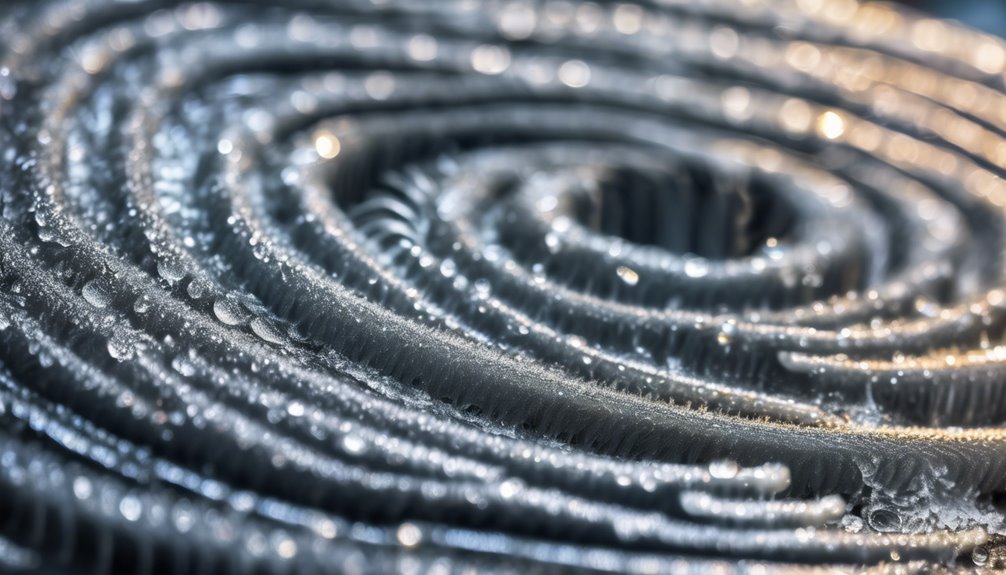Your AC coil keeps freezing because of a combination of factors, including dirty air filters, low refrigerant levels, clogged condenser coils, leaky ducts, and incorrect thermostat settings. These issues restrict airflow, cause refrigerant leaks, and lead to water accumulation, ultimately freezing your AC coil. If you're tired of dealing with this frustrating problem, it's time to get to the bottom of it – and understanding the root causes is just the beginning of finding a solution that will keep your AC running smoothly all summer long.
Key Takeaways
- Airflow restrictions, often caused by dirty filters or blocked vents, increase pressure on the AC, leading to coil freezing.
- Refrigerant leaks or low levels can cause the AC coil to freeze, and neglecting regular inspections can exacerbate the issue.
- Poor airflow design, including improperly sized ducts or coils, restricts air circulation, leading to moisture accumulation and coil freezing.
- Maintenance neglect, such as failing to clean the outdoor unit or change air filters, allows dirt and debris to build up, causing coil freezing.
- Leaky ducts introduce warm, moist air into the system, leading to moisture accumulation on the AC coil and eventual freezing.
Dirty Air Filters: The Hidden Culprit
Because your AC is a complex system, it's easy to overlook a crucial component: the air filter.
However, a dirty air filter can cause your AC coil to freeze, leading to a host of problems. When the filter is clogged with dirt and debris, it restricts airflow, causing the coil to ice up.
You can prevent this by regularly cleaning or replacing your air filter. Filter cleaning is a simple process that can be done at home, but if your filter is damaged or heavily clogged, it's best to opt for filter replacement.
Low Refrigerant: A Recipe for Disaster
Your AC's refrigerant plays a crucial role in the cooling process, and running low on it can have disastrous consequences. Refrigerant leaks can cause your AC to work harder, leading to system inefficiencies and increased energy bills. If left unchecked, low refrigerant levels can lead to a frozen AC coil, which can cause your entire system to malfunction.
| Symptom | Cause | Effect |
|---|---|---|
| Increased Energy Bills | Refrigerant Leaks | System Inefficiencies |
| Reduced Cooling Capacity | Low Refrigerant Levels | Frozen AC Coil |
| Compressor Failure | Prolonged Low Refrigerant | System Breakdown |
| Higher Humidity | Inefficient Cooling | Uncomfortable Living Space |
Clogged Condenser Coils: The Silent Saboteur
Clogged condenser coils can sneak up on you, quietly sabotaging your air conditioner's performance without you even realizing it.
You mightn't notice it at first, but over time, debris accumulation on your condenser coils can lead to coil corrosion, reducing airflow and causing your AC to work harder.
Debris accumulation on condenser coils can lead to coil corrosion, reducing airflow and causing your AC to work harder over time.
This increased strain can cause your AC coil to freeze, leading to a breakdown.
Check your condenser coils regularly to ensure they're clean and free of debris.
A simple cleaning can make a big difference in your AC's performance.
Don't let clogged condenser coils catch you off guard – stay on top of maintenance to keep your AC running smoothly.
Leaky Ducts: The Unseen Enemy
You've checked your condenser coils, but AC coil freezing persists.
Now, it's time to suspect hidden moisture sources, like leaky ducts, which can introduce excess humidity into your system.
Insulation gaps in these ducts can also allow warm, moist air to seep in, further exacerbating the issue.
Hidden Moisture Sources
Leaky ducts are often the unseen enemy behind AC coil freezing issues, as they can introduce hidden moisture sources into the system. You might not even realize that your ducts are leaking, but it's essential to investigate. Moisture can seep into your ducts from humid basements or hidden pipes, causing your AC coil to freeze. Take a closer look at your ductwork to identify potential sources of moisture.
| Hidden Moisture Source | Description |
|---|---|
| Humid Basements | Moist air from basements can seep into ducts, causing condensation |
| Hidden Pipes | Leaks in hidden pipes can introduce water into the duct system |
| Poor Duct Insulation | Insulation gaps can allow moisture to enter the ducts |
| Clogged Air Filters | Restricted airflow can cause moisture buildup |
| High Humidity | Extreme humidity levels can lead to moisture accumulation in ducts |
Insulation Gap Effects
Gaps in duct insulation can be a silent saboteur, allowing moisture to seep into your ductwork and eventually causing your AC coil to freeze.
You mightn't notice these insulation voids, but they can lead to thermal bridging, which means heat is transferred more easily, making your AC work harder.
As a result, condensation builds up, and your coil freezes. It's essential to inspect your ducts for any gaps or cracks in the insulation.
Seal them promptly to prevent moisture from entering and causing further damage. Remember, a well-insulated duct system is crucial to maintaining a healthy, functioning AC unit.
Incorrect Thermostat Settings: A Simple Mistake
You might be surprised to find that your thermostat settings are causing your AC coil to freeze.
If you've set the temperature too low, your AC unit will work overtime, leading to frost buildup. Additionally, if you have an oversized AC unit, it can also cause the coil to freeze, even if you've set the temperature correctly.
Low Temp Setting
Incorrect thermostat settings can be a simple yet crucial mistake that leads to AC coil freezing.
If you set your thermostat too low, you're essentially asking your AC to work overtime. This can cause temperature fluctuation, leading to moisture accumulation on the coil and eventual freezing.
Moreover, incorrect thermostat calibration can also trigger this issue. When you set the temperature too low, your AC's compressor and fan motor work harder, causing the coil to freeze.
Check your thermostat settings and adjust them to a reasonable temperature. Make sure it's calibrated correctly to avoid any temperature fluctuations that might cause your AC coil to freeze.
Oversized AC Unit
An oversized AC unit can be another culprit behind AC coil freezing.
You might think a bigger unit means more cooling power, but it can actually lead to freezing issues. This is because an oversized unit cools the air too quickly, causing the coil to freeze.
It doesn't remove humidity properly, leading to moisture accumulation on the coil.
- It can short cycle, causing the unit to turn on and off frequently, which affects the coil's temperature.
- A load calculation wasn't done correctly, resulting in a unit that's too big for your space.
- Incorrect unit sizing can cause the coil to work inefficiently, leading to freezing.
Defrost Mode Malfunction: When the Fix Becomes the Problem
What happens when the solution intended to prevent AC coil freezing becomes the root of the problem itself?
You've probably noticed that your AC unit has a defrost mode designed to prevent frost formation.
However, if this mode malfunctions, it can actually cause the coil to freeze.
A defrost delay, which is supposed to give your coil a break from cooling, can sometimes get stuck, allowing frost to build up.
Defrost delay gets stuck, allowing frost to build up, ultimately defeating the purpose of this supposed solution.
This can be especially problematic if you live in a humid climate, where moisture in the air can exacerbate the issue.
As a result, you may find yourself dealing with a frozen coil, despite the defrost mode's intended purpose.
It's essential to address this issue promptly to prevent further damage to your AC unit.
Ice Buildup: The Visible Sign of a Deeper Issue
When you notice ice buildup on your AC coil, you're seeing a symptom of a larger problem.
Frozen coil surfaces are a clear indication that something's amiss, and it's likely due to insufficient airflow.
Frozen Coil Surfaces
Frozen coil surfaces, characterized by ice buildup, are often the most visible sign of a deeper issue affecting your AC's performance.
As you're dealing with this problem, it's essential to understand that frozen surfaces are just a symptom of a more significant issue.
When you notice ice buildup on your coil, it's crucial to perform a coil inspection to identify the root cause.
Here are some possible reasons why your AC coil keeps freezing:
- Low refrigerant levels
- Dirty or clogged air filters
- Malfunctioning thermostat
- Defrost mode issues
Insufficient Airflow Causes
How does your air conditioner's airflow impact its performance? Insufficient airflow is a common culprit behind AC coil freezing. When air restrictions occur, your AC has to work harder to cool your space, leading to reduced efficiency and increased energy bills. Coil blockages, such as dirty air filters or blocked vents, can also contribute to this issue.
| Airflow Issue | Effect on AC Performance |
|---|---|
| Dirty air filters | Reduces airflow, increasing pressure on AC |
| Blocked vents | Restricts airflow, causing AC to work harder |
| Improperly sized ducts | Increases air pressure, leading to coil freezing |
| Closed or blocked registers | Reduces airflow, causing AC to overwork |
| Leaky ducts | Allows warm air to enter, causing coil freezing |
Drainage Issues: When Water Meets Air
Air conditioning coils are designed to breathe, but when water gets in the way, drainage issues arise.
You mightn't think about it, but water accumulation is a common culprit behind frozen AC coils. When condensate overflow occurs, it can cause ice to form on your coils, bringing your cooling system to a grinding halt.
Water accumulation is a sneaky culprit behind frozen AC coils, causing condensate overflow and bringing your cooling system to a halt.
Some common drainage issues to look out for include:
- Clogged condensate drains or pipes
- Improperly sloped drain pans
- Blocked air vents or ducts
- Faulty condensate pumps or float switches
Poor Airflow: The Silent Killer of AC Coils
What's quietly suffocating your AC coils?
It's poor airflow, the silent killer of AC coils. You mightn't notice it, but restricted air circulation is a major culprit behind frozen coils.
When air can't flow freely, your AC has to work harder, causing the coil to ice up. It's not just about the air flowing in; it's also about the coil design.
If the coils are too dense or have too many bends, air can get stuck, leading to freezing.
Make sure to keep your vents clear, use a high-quality air filter, and ensure your AC unit has enough clearance from surrounding objects.
Proper air circulation is key to keeping your coils healthy and frost-free.
Maintenance Neglect: The Cost of Ignoring the Obvious
Your AC coils are more than likely crying out for attention, but you're not listening.
You're taking maintenance shortcuts, thinking you're saving time and money, but in reality, you're setting yourself up for a world of trouble.
Neglecting regular coil inspections and cleanings can lead to a buildup of dirt and debris, causing your coils to freeze.
Some common mistakes you might be making include:
- Not changing your air filters regularly
- Not cleaning your outdoor unit regularly
- Not scheduling annual coil inspections
- Not addressing refrigerant leaks promptly
Frequently Asked Questions
Can I Fix a Frozen AC Coil Myself or Do I Need a Pro?
You can try fixing a frozen AC coil yourself, but consider DIY considerations and take necessary safety precautions to avoid electrical shock or refrigerant exposure; if unsure, it's best to call a pro to ensure the job's done safely and correctly.
Will a Frozen AC Coil Affect My Energy Bills?
You're probably wondering if a frozen coil will hike your energy bills. Yes, it will! A frozen coil reduces airflow, causing your AC to work harder, leading to high bills and increased energy consumption.
Can I Prevent My AC Coil From Freezing in the Future?
You can prevent future coil freezing by performing regular coil maintenance, ensuring proper air circulation around the unit, and keeping the surrounding area clean to allow for efficient airflow and heat transfer.
How Long Does It Take for an AC Coil to Freeze?
You'll typically notice frost formation on your AC coil within 24 to 48 hours if it's dirty or clogged, but it can happen faster in extreme humidity or heat. Regular coil inspection can help you catch issues before they lead to freezing.
Can a Frozen AC Coil Cause Mold and Mildew Growth?
You're wondering if a frozen coil can lead to mold and mildew growth. Yes, it can! When humidity levels are high, moisture accumulates on the coil, and if it's not clean, mold and mildew thrive, causing unhealthy air circulation and unpleasant odors.
Conclusion
So, you've identified the possible reasons why your AC coil keeps freezing. Now it's time to take action. Check and clean those air filters, inspect for refrigerant leaks, and clear any debris from condenser coils. Ensure your ducts are sealed, thermostat settings are correct, and drainage is functioning properly. Improve airflow and stay on top of maintenance. By addressing these potential issues, you'll be well on your way to preventing future coil freezes and keeping your AC running smoothly.



